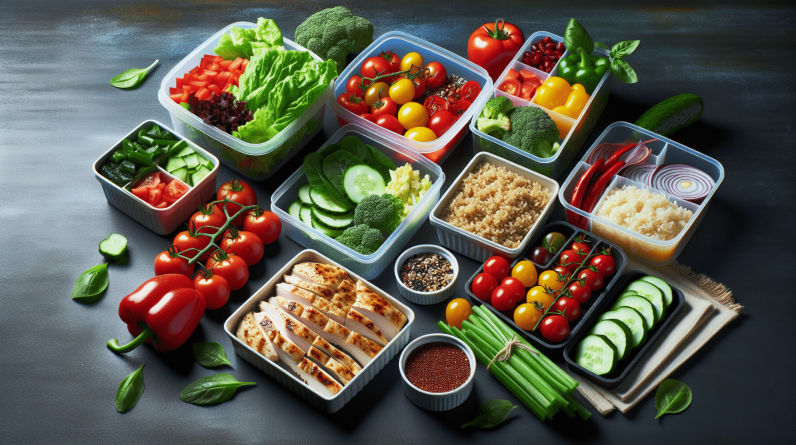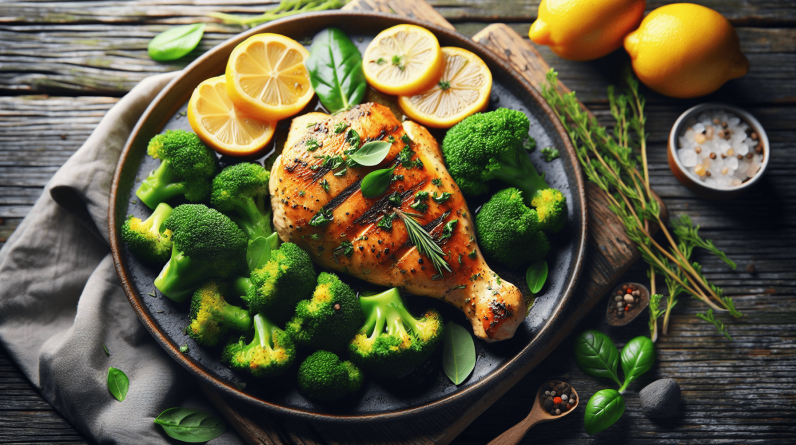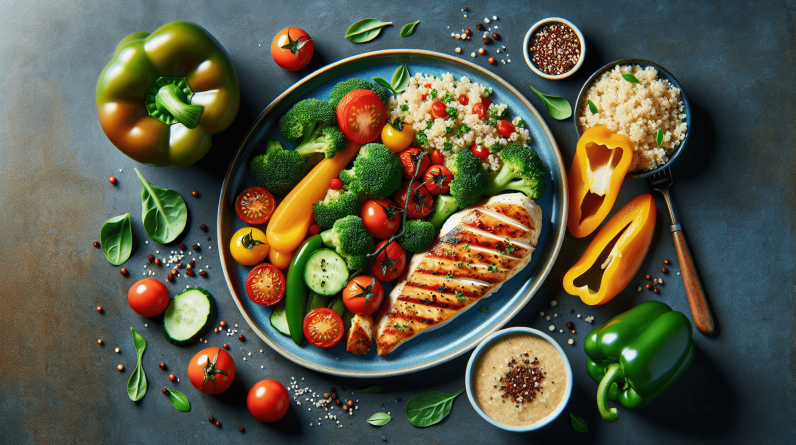
Looking for natural weight loss tips? Say goodbye to restrictive diets and grueling workouts with these simple and effective tips for shedding those extra pounds. Improve your overall well-being and reach your weight loss goals with mindful eating, dietary changes, portion control, regular exercise, and healthy lifestyle habits. Plus, discover the benefits of meal planning and preparation, cooking your own meals, and practicing mindful eating habits. Start your journey towards a healthier and happier you today!
Losing weight can be a daunting journey, but fear not, because we have got you covered with some amazing natural weight loss tips! Say goodbye to restrictive diets and grueling workout routines, as we bring you simple and effective ways to shed those extra pounds without compromising your health. From incorporating more fruits and vegetables into your diet to embracing mindful eating, these tips will not only help you reach your weight loss goals but also improve your overall well-being. So, get ready to embark on a journey towards a healthier and happier you!
Dietary Changes
Eating a balanced diet is essential for natural weight loss. This means including a variety of foods from different food groups in your meals. Make sure to incorporate lean protein sources such as chicken, fish, tofu, and legumes. Include plenty of fruits and vegetables for essential vitamins, minerals, and fiber. Whole grains like brown rice, quinoa, and whole wheat bread should also be included for their nutritional value. Don’t forget healthy fats from sources like nuts, seeds, and avocados. By choosing a balanced diet, you provide your body with the necessary nutrients for optimal health while still losing weight.
Focus on consuming whole foods rather than processed foods. Whole foods are those that are minimally processed and contain all the essential nutrients. Fresh fruits and vegetables, lean meats, whole grains, and nuts are great examples of whole foods. These foods provide your body with essential vitamins, minerals, and antioxidants, which support weight loss. They are also typically lower in calories and higher in fiber, which can help you feel fuller for longer and curb cravings. By emphasizing whole foods in your diet, you are giving your body the best chance for natural weight loss.
Including high-fiber foods in your diet can aid in weight loss. Fiber is an indigestible carbohydrate that adds bulk to your diet and helps you feel full. Foods like fruits, vegetables, whole grains, and legumes are all rich in fiber. Not only does fiber keep you satisfied, but it also helps regulate your digestion and keep your blood sugar levels stable. Aim to consume around 25-30 grams of fiber per day to support natural weight loss.
Limiting processed foods is crucial for achieving your weight loss goals. Processed foods are often high in added sugars, unhealthy fats, and excess sodium. These types of foods are typically calorie-dense and nutrient-poor, meaning they provide little nutritional value for the number of calories they contain. By cutting back on processed foods like chips, cookies, sugary cereals, and fast food, you can significantly reduce your calorie intake, making weight loss more manageable.
Drinking plenty of water is a simple but effective tip for natural weight loss. Water is calorie-free and can help curb your appetite. Sometimes, your body may mistake thirst for hunger, leading you to eat when all you need is hydration. By staying properly hydrated, you can avoid unnecessary snacking and overeating. Aim for at least eight cups (64 ounces) of water per day, and even more if you engage in exercise or live in a hot climate.
Portion Control
Using smaller plates is an excellent strategy for portion control. When you have a smaller plate, it creates the illusion that you are eating more food than you actually are. This psychological trick can help you feel satisfied with smaller portions. By downsizing your plate, you naturally reduce the amount of food you consume, leading to fewer calories and eventual weight loss.
Eating mindfully is another essential aspect of portion control. Mindful eating involves paying attention to your food, savoring each bite, and being aware of your body’s hunger and fullness cues. Many of us eat quickly and mindlessly, leading to overeating and weight gain. By slowing down and truly enjoying your food, you give yourself the opportunity to recognize when you’ve had enough. Take the time to chew your food thoroughly and appreciate the flavors and textures. This mindful approach to eating can help you maintain portion control and make healthier choices.
Listening to your body’s hunger cues is crucial for portion control. Often, we eat out of habit or emotions rather than genuine hunger. Learning to distinguish between true hunger and emotional cravings is an important skill for natural weight loss. Before reaching for a snack or a second serving, pause and ask yourself if you are truly hungry. If you’re not, find alternative ways to address your emotions or distract yourself. By tuning into your body’s hunger signals, you can avoid overeating and maintain a balanced diet.
Regular Exercise
Engaging in aerobic exercises is a fantastic way to support weight loss. These types of exercises increase your heart rate and help burn calories. Walking, running, swimming, cycling, and dancing are all excellent aerobic activities. Aim for at least 150 minutes of moderate-intensity aerobic exercise per week or 75 minutes of vigorous-intensity exercise. By incorporating regular aerobic exercise into your routine, you can boost your metabolism and shed those extra pounds.
Incorporating strength training into your exercise routine is essential for natural weight loss. Strength training involves working your muscles against resistance, such as using weights or resistance bands. This type of exercise helps build lean muscle mass, which boosts your metabolism and helps you burn more calories even at rest. Additionally, strength training can improve your overall body composition, giving you a toned and sculpted appearance. Aim for at least two strength training sessions per week, targeting different muscle groups for optimal results.
Trying high-intensity interval training (HIIT) is a time-efficient and effective way to lose weight. HIIT involves short bursts of intense exercise followed by brief recovery periods. This type of training boosts your heart rate and burns more calories in a shorter amount of time compared to steady-state cardio. Examples of HIIT exercises include sprinting, burpees, jump squats, and mountain climbers. Implementing HIIT workouts into your routine a few times a week can help accelerate weight loss and improve cardiovascular fitness.
Including physical activity in your daily routine is an important aspect of natural weight loss. Look for opportunities to move more throughout your day, such as taking the stairs instead of the elevator, walking or biking to work, or going for a hike on the weekends. Incorporating physical activity into your daily life not only helps burn calories but also improves your overall health and well-being. Make it a priority to be more active and find activities that you enjoy to make exercise sustainable in the long term.
Healthy Lifestyle Habits
Getting sufficient sleep is vital for natural weight loss. Lack of sleep can disrupt your hormones responsible for appetite regulation, leading to increased hunger and cravings. Aim for seven to nine hours of quality sleep per night to support your weight loss efforts. Establishing a consistent bedtime routine and creating a relaxing environment in your bedroom can help improve your sleep quality. By getting enough restful sleep, you’ll have the energy and focus to make healthier food choices and stay motivated.
Managing stress levels is crucial when it comes to natural weight loss. Stress can lead to emotional eating and poor food choices, which hinder your weight loss progress. Find healthy ways to manage stress, such as practicing mindfulness, engaging in hobbies, or seeking support from friends and family. Incorporating stress-reducing activities like yoga, meditation, or taking a walk can have a significant impact on your overall well-being and weight loss journey.
Limiting alcohol consumption is important for achieving your weight loss goals. Alcoholic beverages are high in calories and can inhibit fat burning in the body. Additionally, drinking alcohol can lower inhibitions and lead to poor food choices and overeating. While moderate alcohol consumption can be a part of a balanced lifestyle, it’s essential to be mindful of the calories and potential negative effects on weight loss. Aim to limit your alcohol intake and opt for healthier alternatives like sparkling water or herbal tea.
Quitting smoking is not only crucial for overall health but can also positively impact your weight loss journey. Smoking is associated with increased appetite, decreased metabolism, and unhealthy food cravings. Quitting smoking can restore your taste and smell senses, making healthier foods more appealing. Additionally, quitting smoking reduces your risk of weight-related diseases and improves your overall well-being. If you need help quitting, seek support from healthcare professionals or support groups to increase your chances of success.
Meal Planning and Preparation
Planning your meals ahead of time is a powerful tool for natural weight loss. By sitting down and creating a weekly meal plan, you can ensure that you make healthier choices and avoid impulsive decisions. Plan balanced meals that include lean proteins, plenty of vegetables, whole grains, and healthy fats. Make a grocery list based on your meal plan to avoid buying unnecessary and unhealthy foods. Preparing your meals in advance can also save time and prevent relying on convenience foods or takeout. With a solid meal plan in place, you’ll be set up for success on your weight loss journey.
Prepare healthy snacks in advance to support your weight loss goals. Having nutritious snacks readily available can prevent you from reaching for unhealthy options when hunger strikes. Chop up fresh fruits and vegetables and store them in portioned containers for easy snacking. Other healthy snack options include nuts, seeds, Greek yogurt, or homemade protein bars. By preparing your snacks ahead of time, you can make sure you always have a healthy option on hand to satisfy your cravings.
Cooking your own meals is one of the most effective ways to control the ingredients and portion sizes. When you cook at home, you have full control over the amount of oil, salt, and sugar used in your dishes. You can also experiment with different flavors and techniques to make healthy meals more exciting and enjoyable. Cooking at home encourages mindful eating and allows you to appreciate the effort and love that goes into preparing your own food. Make cooking a fun and creative activity, and involve family or friends to share the joy of preparing nutritious meals together.
Mindful Eating Habits

Avoiding emotional eating is crucial for successful weight loss. Emotional eating occurs when you use food to cope with stress, sadness, or other emotions rather than to satisfy physical hunger. It is essential to recognize the difference between emotional hunger and physical hunger. Next time you feel the urge to eat, pause and assess your emotions. Ask yourself if you are genuinely hungry or if there is an underlying emotional trigger. If emotions are the driving force, find alternative ways to address them, such as taking a walk, journaling, or talking to a supportive friend. Breaking the habit of emotional eating is key to achieving and maintaining a healthy weight.
Slowing down and chewing thoroughly is an excellent practice for mindful eating. Many of us rush through our meals, barely taking the time to taste and savor the food. By slowing down and chewing your food thoroughly, you give your brain a chance to register when you’re full. Chewing properly also aids in digestion and nutrient absorption. Put down your utensils between bites, focus on the flavors and textures, and chew each bite thoroughly. Not only will this practice help you control portion sizes, but it will also enhance your overall enjoyment of meals.
Paying attention to food labels is vital for making informed choices about what you eat. Food labels provide valuable information about the ingredients, nutritional content, and portion sizes of packaged foods. When reading food labels, look for products with minimal added sugars, unhealthy fats, and artificial ingredients. Pay attention to the serving size and adjust your portion accordingly. By becoming an informed consumer, you can make healthier choices and avoid hidden sources of excess calories or unhealthy additives.
Keeping a food journal can be a helpful tool for staying accountable and tracking your progress. By writing down what you eat and drink throughout the day, you become more aware of your eating habits and patterns. A food journal can also help you identify triggers for overeating or emotional eating. Write down not only what you eat but also how you feel before and after each meal. This practice can help you make more conscious and mindful choices around food and support your weight loss journey.
Reduce Sugary and Sweetened Beverages
Limiting soda and energy drinks is essential for natural weight loss. These beverages are loaded with added sugars and provide no nutritional value. The high sugar content in sugary drinks can contribute to weight gain and increase the risk of obesity-related diseases. Replace soda and energy drinks with healthier alternatives like water, herbal tea, or flavored sparkling water. By eliminating these sugary beverages from your diet, you can significantly reduce your calorie intake and support weight loss.
Choosing water or unsweetened beverages is a simple yet powerful way to reduce your calorie intake. Water is the healthiest and most natural drink choice. It is calorie-free and helps keep your body hydrated. Make it a habit to drink water throughout the day and replace sugary drinks with this refreshing option. If plain water isn’t your favorite, add a slice of lemon or cucumber for a burst of flavor. Unsweetened herbal tea or black coffee are also excellent alternatives for a calorie-free beverage choice.
Avoid fruit juices with added sugars to reduce your overall calorie intake. While fruit juice may seem like a healthy option, many commercial brands are loaded with added sugars. These added sugars can quickly add up and hinder your weight loss progress. Instead of fruit juices, opt for whole fruits, as they contain fiber and are more filling. If you prefer drinking fruit juice, make sure to check the labels for added sugars or consider diluting it with water to reduce the overall sugar content.
Get Support and Accountability
Joining a weight loss program can provide you with the support and guidance you need to achieve your goals. Weight loss programs typically offer a structured plan, nutritional advice, and accountability through group meetings or individual coaching sessions. These programs can provide you with the tools and knowledge to make sustainable lifestyle changes and overcome common weight loss challenges. Look for a program that aligns with your values and preferences, and be open to the support and resources they offer.
Finding a workout buddy can significantly enhance your weight loss journey. Exercising with a partner not only makes your workouts more enjoyable but also increases motivation and accountability. You can push each other to achieve your fitness goals and provide support during challenging times. Whether it’s going for a walk, attending fitness classes, or hitting the gym together, having a workout buddy can make the entire process more fun and rewarding.
Seeking help from a registered dietitian can provide you with expert advice and personalized recommendations for your weight loss journey. Registered dietitians are trained professionals who specialize in nutrition and can create a tailored plan to meet your specific needs. They can help you navigate through the abundance of information available and provide evidence-based strategies for healthy weight loss. A registered dietitian can also address any underlying health conditions or concerns that may impact your weight loss progress. Reach out to a registered dietitian to receive professional guidance and support throughout your journey.
Avoid Crash Diets
Focusing on sustainable weight loss is key to achieving long-term success. Crash diets, which promise rapid weight loss in a short amount of time, are often unsustainable and can be detrimental to your health. These extreme diets typically involve severe calorie restriction or the elimination of entire food groups. While you may see initial weight loss, crash diets can lead to muscle loss, nutrient deficiencies, and a slower metabolism. Instead, focus on making gradual and sustainable changes to your eating and exercise habits. Aim for a healthy and realistic weight loss of 1-2 pounds per week, which is more likely to be maintained over time.
Avoiding extreme calorie restriction is crucial for long-term weight loss success. Severely restricting your calorie intake can lead to a slowed metabolism and muscle loss. It can also disrupt your relationship with food and lead to unhealthy behaviors. Instead of drastically cutting calories, focus on making healthier food choices, portion control, and incorporating regular physical activity. This approach allows you to create a sustainable lifestyle that supports natural weight loss and overall well-being.
Seeking professional guidance is essential when it comes to weight loss. Nutritionists, registered dietitians, and healthcare professionals can provide you with evidence-based information, personalized advice, and ongoing support. They can help you determine the optimal calorie intake for your goals, create a balanced meal plan, and monitor your progress. Working with a professional can increase your chances of success and ensure that you are losing weight in a safe and sustainable manner.
Stay Consistent and Persistent
Setting realistic goals is important for staying motivated and consistent on your weight loss journey. Instead of aiming for a specific number on the scale, focus on small, achievable goals that contribute to your overall health and well-being. Celebrate non-scale victories, such as improved energy levels, increased endurance, or better fitting clothes. By setting realistic goals, you avoid feeling overwhelmed or discouraged and maintain a positive mindset throughout your journey.
Monitoring your progress is essential for staying on track with your weight loss goals. Keep track of your body measurements, weight, and any changes in fitness or energy levels. Take progress photos or record your measurements regularly to visually track your progress. While the scale can be a helpful tool, it’s important to remember that weight loss is not the sole indicator of progress. By monitoring different aspects of your health and fitness, you gain a holistic view of your journey and can celebrate achievements beyond just a number.
Staying motivated is crucial for long-term weight loss success. Find ways to keep yourself inspired, whether it’s through setting rewards for reaching milestones, surrounding yourself with positive influences, or visualizing your desired outcome. Explore new recipes, try different forms of exercise, or join online communities that share your weight loss goals. By continually finding inspiration and staying committed, you can overcome challenges and continue on the path to achieving your natural weight loss goals.
In conclusion, natural weight loss is achieved through making sustainable lifestyle changes. By following a balanced diet, focusing on portion control, engaging in regular exercise, and implementing healthy lifestyle habits, you can successfully lose weight and improve your overall well-being. Incorporating meal planning and preparation, mindful eating habits, reducing sugary beverages, and getting support and accountability can further enhance your weight loss journey. Remember to avoid crash diets, stay consistent, and set realistic goals to maintain motivation and persist on your path to natural weight loss. With dedication and patience, you can achieve your desired weight and embrace a healthier and happier life.







